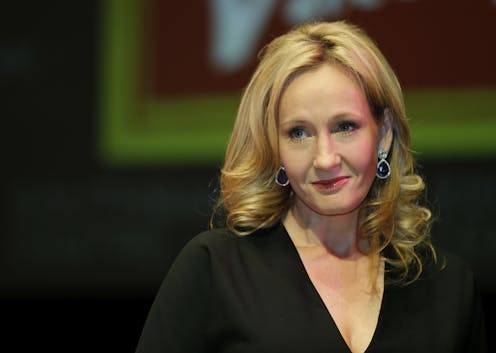Witch trials, TERF wars and the voice of conscience in a new podcast about J.K. Rowling
- Written by Hugh Breakey, Deputy Director, Institute for Ethics, Governance & Law. President, Australian Association for Professional & Applied Ethics., Griffith University

One of the year’s most anticipated podcasts, The Witch Trials of J.K. Rowling, has just launched. Only two episodes of the audio documentary are currently available, with more to follow in the coming weeks.
Rowling is arguably the world’s most successful fiction author. She reigns over the multibillion-dollar Harry Potter industry, which includes books, theme parks, films and computer games.
But it is the controversy over Rowling’s statements on gender and trans rights that have fuelled the wider public interest in the podcast. These are not the focus of the early episodes, which nevertheless provide some revealing contextualising information about her stance.
What’s all the fuss about?
Even before 2020, when Rowling tweeted her frustration about an article that referred to “people who menstruate”, questions about her stance on trans issues had been building.
In 2019, Rowling came out in support of Maya Forstater, who lost her job for tweets disputing whether transgender women can change their sex. Forstater claimed her employer had unfairly discriminated against her. Last year, an employment tribunal agreed.
There was an immediate groundswell of protest against Rowling’s tweets, with many people – including lifelong Harry Potter fans – calling out her claims as “transphobic”. Several actors in the Harry Potter films distanced themselves from Rowling with strong messages of support for trans people. Stephen King, an idol of Rowling’s, was blocked by her on Twitter after he tweeted: “Trans women are women”.
Rowling then published an essay, explaining that while she sympathised with many trans people’s need for safety, she had concerns about the contemporary trans movement. These included the explosion of young women wishing to transition into men, the safety of women’s spaces being compromised if they were opened to biological males, and the climate of fear that many experience when discussing these issues publicly.
Rowling discussed how her view was shaped by her own challenges with sexuality as a young woman, and being a domestic abuse and sexual assault survivor.
The essay was the subject of immediate controversy. Many asserted it was dangerous and transphobic. Rowling was castigated as a “TERF”: a Trans Exclusionary Radical Feminist. (Many of Rowling’s supporters prefer the term “gender critical”.) Commentators penned detailed arguments that Rowling’s claims were flawed and baseless.
The wider context
One relevant context of Rowling’s position concerns the status, safety and legal protections available to trans people. Another is the state of free speech, the polarisation of public debate, and the implications of disagreement in the contemporary world.
Less than a month after her Twitter controversy, Rowling was a signatory to an open letter published in Harper’s magazine, claiming that “open debate and toleration of differences” were under attack. Rowling’s signature sat alongside those of many other famous authors and scholars, including Margaret Atwood, Gloria Steinem and Noam Chomsky.
Spearheaded and drafted by US author and cultural critic Thomas Chatterton Williams, the letter argued there was increasing censoriousness characterised by:
an intolerance of opposing views, a vogue for public shaming and ostracism, and the tendency to dissolve complex policy issues in a blinding moral certainty.
The Open Letter created its own controversy, with other luminaries speaking out against it.
Almost three years on, the culture wars continue on this issue. What some see as necessary measures to prevent harms and respond to systemic inequality, others see as “cancel culture” – the practice of responding to disagreeable views with efforts to deplatform, disinvite, suppress or punish the speaker. As a culture, we seem to have lost the capacity to disagree constructively.
There is little sign such views are abating. Indeed, a 2022 survey of UK university students showed a hardening of positions against free expression, with a third of those polled thinking academics should be fired if they teach material that heavily offends some students.




